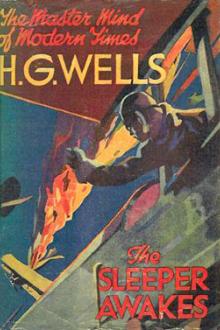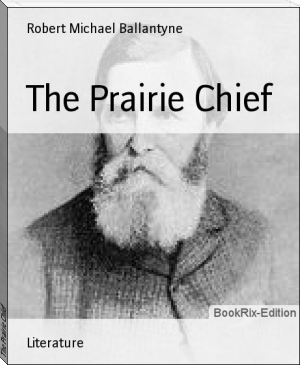Charlie to the Rescue, Robert Michael Ballantyne [pocket ebook reader txt] 📗

- Author: Robert Michael Ballantyne
Book online «Charlie to the Rescue, Robert Michael Ballantyne [pocket ebook reader txt] 📗». Author Robert Michael Ballantyne
it; an' what's more, Mr Crossley, I _won't_ stand it! Just think,
sir, 'ow silly it is to put a bit of clay in your mouth an' draw smoke
through it, an' then to spit it out again as if you didn't like it; as
no more no one _does_ on beginnin' it, for boys only smoke to look
like men, an' men only smoke because they've got up the 'abit an'
can't 'elp it. W'y, sir, you may git up _any_ 'abit. You may git the
'abit of walkin' on your 'ands an' shakin' your legs in the hair if
you was to persevere long enough, but that would only prove you a fool
fit for a circus or a lunatic asylum. You never see the hanimals
smokin'. They knows better. Just fancy! what would you think if you
saw the cab 'osses all a-settin' on their tails in the rank smokin'
pipes an' cigars! What would you think of a 'oss w'en 'is cabby
cried, "Gee-up, there's a fare a 'owlin' for us," an' that 'oss would
say, "Hall right, cabby, just 'old on, hold man, till I finish my
pipe"? No, Mr Crossley, no, I--'
"`But, my good soul!' I burst in here, `do listen--'
"`No use good-soulin' me, Mr Crossley. I tell you I won't stand it.
My dear father died of it, an' I _can't_ stand it--'
"`I _hate_ it, Mrs Bland, myself!'
"I shouted this interruption in such a loud fierce tone that the good
woman stopped and looked at me in surprise.
"`Yes, Mrs Bland,' I continued, in the same tone, `I detest smoking.
You know I always did, but now more than ever, for your reasoning has
convinced me that there are _some_ evil consequences of smoking which
are almost worse than smoking itself! Rest assured that never again
shall the smell of the noxious weed defile the walls of this house.'
"`Lauk, sir!' said Mrs Bland.
"I had subdued her, Charlie, by giving in with dignity. I shall try
the same role next breeze that threatens.
"I almost feel that I owe you an apology for the length of this
epistle. Let me conclude by urging you to bring poor Leather home,
strong and well. Tell him from me that there is a vacant situation in
the firm of Withers and Company which will just suit him. He shall
have it when he returns--if God spares me to see him again. But I'm
getting old, Charlie, and we know not what a day may bring forth."
"A kind--a very kind letter," said Leather earnestly, when his friend had finished reading.
"Why, he writes as if he were your own father, Brooke," remarked Buck Tom, who had been listening intently. "Have you known him long?"
"Not long. Only since the time that he gave me the appointment of supercargo to the _Walrus_, but the little I have seen of him has aroused in me a feeling of strong regard."
"My sister May refers to him here," said Leather, with a peculiar smile, as he re-opened his letter. "The greater part of this tells chiefly of private affairs which would not interest any of you, but here is a passage which forms a sort of commentary on what you have just heard:--
"`You will be amused to hear,' she writes, `that good Captain Stride
has come to live in Sealford. Kind old Mr Crossley has given him
some sort of work connected with Withers and Company's house which I
can neither understand nor describe. Indeed, I am convinced it is
merely work got up on purpose by Mr Crossley as an excuse for giving
his old friend a salary, for he knows that Captain Stride would be
terribly cast down if offered a _pension_, as that would be equivalent
to pronouncing him unfit for further duty, and the Captain will never
admit himself to be in that condition till he is dying. Old Jacob
Crossley--as you used to call him--thinks himself a very sagacious and
"deep" man, but in truth there never was a simpler or more transparent
one. He thinks that we know nothing about who it is that sends the
old lady to buy up all the worsted-work that mother makes, but we know
perfectly well that it is himself, and dear mother could never have
gone on working with satisfaction and receiving the money for it all
if we had not found out that he buys it for our fishermen, who are
said really to be very much in need of the things she makes.
"`The dear old man is always doing something kind and considerate in a
sly way, under the impression that nobody notices. He little knows
the power of woman's observation! By the way, that reminds me that he
is not ignorant of woman's powers in other ways. We heard yesterday
that his old and faithful--though rather trying--housekeeper had
quarrelled with him about smoking! We were greatly surprised, for we
knew that the old gentleman is not and never was, a smoker. She
threatened to leave, but we have since heard, I am glad to say, that
they have made it up!
"H'm! there's food for meditation in all that," said Dick Darvall, as he knocked the ashes out of his pipe and put it in his vest pocket.
CHAPTER TWENTY SEVEN.
HUNKY BEN AND CHARLIE GET BEYOND THEIR DEPTH, AND BUCK TOM GETS BEYOND RECALL.
While hunting together in the woods near Traitor's Trap one day Charlie Brooke and Hunky Ben came to a halt on the summit of an eminence that commanded a wide view over the surrounding country.
"'Tis a glorious place, Ben," said Brooke, leaning his rifle against a tree and mounting on a piece of rock, the better to take in the beautiful prospect of woodland, river, and lake. "When I think of the swarms of poor folk in the old country who don't own a foot of land, have little to eat and only rags to cover them, I long to bring them out here and plant them down where God has spread His blessings so bountifully, where there is never lack of work, and where Nature pays high wages to those who obey her laws."
"No doubt there's room enough here," returned the scout sitting down and laying his rifle across his knees. "I've often thowt on them subjects, but my thowts only lead to puzzlement; for, out here in the wilderness, a man can't git all the information needful to larn him about things in the old world. Dear, dear, it do seem strange to me that any man should choose to starve in the cities when there's the free wilderness to roam about in. I mind havin' a palaver once wi' a stove-up man when I was ranchin' down in Kansas on the Indian Territory Line. Screw was his name, an' a real kind-hearted fellow he was too--only he couldn't keep his hand off that curse o' mankind, the bottle. I mentioned to him my puzzlements about this matter, an' he up fist an' come down on the table wi' a crack that made the glasses bounce as if they'd all come alive, an' caused a plate o' mush in front of him to spread itself all over the place--but he cared nothin' for that, he was so riled up by the thowts my obsarvation had shook up.
"`Hunky Ben,' says he, glowerin' at me like a bull wi' the measles, `the reason we stay there an' don't come out here or go to the other parts o' God's green 'arth is 'cause we can't help ourselves an' don't know how-- or what--don't know nothin' in fact!'
"`That's a busted-up state o' ignorance, no doubt' said I, in a soothin' sort o' way, for I see'd the man was riled pretty bad by ancient memories, an' looked gittin' waxier. He wore a black eye, too, caught in a free fight the night before, which didn't improve his looks. `You said _we_ just now,' says I. `Was you one o' them?'
"`Of course I was,' says he, tamin' down a little, `an' I'd bin one o' them yet--if not food for worms by this time--if it hadn't bin for a dook as took pity on me.'
"`What's a dook?' says I.
"`A dook?' says he. `Why, he's a _dook_, you know; a sort o' markis-- somewheres between a lord an' a king. I don't know zackly where, an hang me if I care; but they're a bad lot are some o' them dooks--rich as Pharaoh, king o' J'rus'lem, an' hard as nails--though I'm bound for to say they ain't all alike. Some on 'em's no better nor costermongers, others are _men_; men what keeps in mind that the same God made us all an' will call us all to the same account, an' that the same kind o' worms 'll finish us all off at last. But this dook as took pity on me was a true blue. He wasn't one o' the hard sort as didn't care a rush for us so long as his own stummick was full. Neether was he one o' the butter-mouths as dursen't say boo to a goose. He spoke out to me like a man, an' he knew well enough that I'd bin born in the London slums, an' that my daddy had bin born there before me, an that my mother had caught her death o' cold through havin' to pawn her only pair o' boots to pay my school fees an' then walk barefutt to the court in a winter day to answer for not sendin' her boy to the board school--_her_ send me to school!--she might as well have tried to send daddy himself; an' him out o' work, too, an' all on us starvin'. My dook, when he hear about it a'most bust wi' passion. I hear 'im arterwards talkin' to a overseer, or somebody, "confound it," says he--no, not quite that, for my dook he _never_ swore, only he said somethin' pretty stiff--"these people are starvin'," says he, "an' pawnin' their things for food to keep 'em alive, an' they can't git work nohow," says he, "an' yet you worry them out o' body an' soul for school fees!" I didn't hear no more, for the overseer smoothed 'im down somehows. But that dook--that good _man_, Hunky Ben, paid my passage to Ameriky, an' sent me off wi' his blessin' an' a Bible. Unfortnitly I took a bottle wi' me, an when I got to the other side I got hold of another bottle, an' another--an' there stands the last of 'em.'
"An' wi' that, Mr Brooke, he fetched the bottle in front of him such a crack wi'





Comments (0)